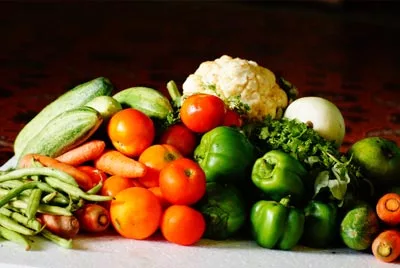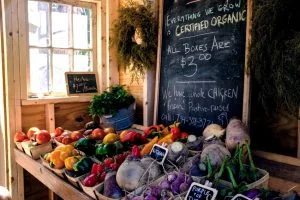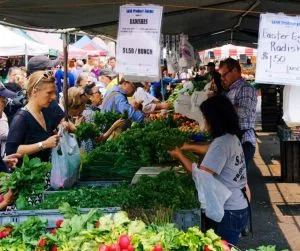
Farm-to-table is the trend to create fresh meals using ingredients and resources from local farms. Ingredients are minimally processed and contain fewer additives than most foods purchased at the grocery store. Many times, fruits, vegetables, and meats are grown organically, making them healthier for the environment and the diners.
When local ingredients are coupled with the skilled craftsmanship of a chef, patrons enjoy the dining experience because of fresher and cleaner flavors. With the rising popularity of this dining concept, it is only natural to bring farm-to-table fundraising event ideas to the table.
If you’ve been wondering how to plan farm to table fundraisers, we’re here to help! Below we detail the most popular options for farm-to-table fundraisers and key steps in the event planning process.

What We’ll Cover
- Option 1: Farm-to-Table Dinner Fundraisers (More Formal)
- Option 2: Farm to Table Tasting Events (More Casual)
- Planning a Fundraising Goal and Budget
- Finding the Event Venue
- Seeking Farm to Table Fundraising Event Sponsors
- Utilizing Event Ticketing and Management Software
- Organizing Insurance, Permits, and Paperwork
- Recruiting and Delegating Volunteers
- Maximizing Funds for Farm to Table Fundraisers
Option 1: Farm-to-Table Dinner Fundraisers (More Formal)
Many farm to table fundraisers choose this option. A major benefit of a farm-to-table dinner fundraiser is that it is an ideal setting for a higher-cost ticket. Several course meals are typically associated with a higher-end dining experience, so ticket prices can be higher. If you choose a farm-to-table dinner fundraiser, you’ll need to work with a great chef and plan a seasonally appropriate dinner menu. The other consideration when choosing this style of event is that guests will expect a focus on hospitality and service. Whether you enlist volunteer servers, hire a company, or use servers provided by the venue or one of your event sponsors, a memorable dining experience always includes good service.
Option 2: Farm to Table Tasting Events (More Casual)

The other approach to farm-to-table fundraisers is to offer a food fair or tasting event. The benefit of this concept is that attendees enjoy the event with more autonomy to walk around and taste the foods and drinks that they prefer. It is not as formal and doesn’t require a full dinner menu and planning. This format works great for beer and wine tastings as well.
A farm to table tasting allows for a more relaxed environment and more ticket sales. Tasting events tend to draw a larger crowd since tickets are typically cheaper for tasting events and food festivals. The consideration when hosting a farm-to-table tasting event is that there is more heavy emphasis on sponsorship and vendor outreach. The number of participating vendors and sponsors often dictates the ticket price (or vice versa), as well as the food and drink supply available for attendees, so there may be pressure to acquire a certain number of sponsors.
Planning a Fundraising Goal and Budget
Before planning logistics behind the farm-to-table fundraiser, it all begins with planning the event budget. Begin the budget planning with the proceeds goal (the amount that goes towards your organization or cause) that the event should raise. Then itemize costs to understand the gross amount that needs to be raised (the total to cover both proceeds and costs). From here, perform an analysis of which price point and target number of attendees are needed to meet your fundraising goal. Then decide on which scenario is the best fit for your organization based on available resources, effort, and the time your team can dedicate to the event execution.
Finding the Event Venue

The venue is certainly part of the fun of hosting a farm-to-table fundraising event. If there is a farm that participates as a vendor for farm-to-table restaurants, consider inquiring if they have space to host a dinner or tasting event. This may be an outdoor space that requires tents or a barn that they rent out for special events. This is the best idea!
Alternatively, consider inquiring about a restaurant that focuses on farm-to-table dining or an establishment that focuses on locally crafted drinks to block off an afternoon or evening to host the event. This venue type can greatly minimize costs and the effort to organize volunteers to serve and tend to attendees. If these spaces are not available, consider researching venues that can best accommodate the format of one of the farm-to-table event ideas, whether it is a park, a gallery, or a general event space.
Seeking Farm to Table Fundraising Event Sponsors
As with all nonprofit fundraising event ideas, sponsors can greatly decrease the cost of hosting farm to table fundraisers. This allows more of the funds you raise to go toward your charitable cause or effort.
- Food and Beverage Sponsors: Since farm-to-table fundraisers have a primary focus on dining and drinking (of all types of beverages), it would greatly help to decrease the cost to seek food and beverage sponsors. Many farms, local stores, and restaurants will be interested in the recognition they receive from donating their wares for your event, It may be towards the ingredients of preparing the dinner or prepared foods and drinks to serve bite-sized tasting portions to attendees.
- Service-Oriented Sponsors: If the farm-to-table fundraiser is a dinner, it is important to have a chef or culinary professional to help craft the menu and plan the kitchen logistics to prepare the menu on the day of the event. Another type of sponsorship that would be helpful is a caterer. Oftentimes caterers will have liquor permits that can welcome a whole new appeal to the event, if a bartender or mixologist is available. Otherwise, wine and beer are the most frequently served beverages because of permit restrictions for non-catered events. Another type of service that would be helpful is dishware, flatware, linens, tents, and event furniture rentals, which might otherwise need to be rented.
- Prize Sponsors: There may be activities that are also added to the itinerary to help bring in additional funds, whether it is a fundraising raffle or a silent auction. More appealing prizes result in bringing in more raffle sales and higher bids for auctions. Take time to understand the audience and find sponsors that can offer prizes that will appeal to them. This may be spa services, event tickets for sporting events or performances, luxury experiences like a high-end dinner, vacation getaways and more.
- Monetary Sponsors: Last but not least, one of the most helpful types of sponsorship is monetary donations. Since hosting these fundraisers often require funds to cover overhead event costs, monetary support can help a great deal.
Read more on securing sponsors for your nonprofit event.
Utilizing Event Ticketing and Management Software
Once all the logistics are in place, ensure the farm to table fundraiser goes well by utilizing great event management software to collect ticket sales, provide reporting and manage event logistics, such as volunteer and sponsor management.

Organizing Insurance, Permits, and Paperwork
When hosting a special event that draws a large crowd and involves food and beverages (especially alcoholic beverages), all necessary paperwork must be in place. Not having the right paperwork can damper your event, whether it forces your event to be canceled or doesn’t allow for beer and wine to be served. First, research is whether an event permit is needed. This is more applicable to public spaces, such as a park. The next type of paperwork is researching event insurance. Event insurance minimizes the liability against your nonprofit organization in the case of an accident that results in an injury (and then may lead to a lawsuit). If alcoholic beverages are served, there is typically a beer and wine permit that must be acquired. With a catering service or restaurant, you may be able to inquire if you can use theirs (this applies to both event insurance and beverage permits).
Recruiting and Delegating Volunteers

Based on your venue and sponsors, some of the tasks needed to successfully run a farm-to-table fundraiser might be able to be delegated to their staff or helpers. See if the venue or sponsor is willing to include wait staff, servers, or other helpful services that might otherwise require a volunteer or hired contractor.
Volunteers will certainly be an asset to your organization when planning a farm-style charity event. Volunteers may be needed to assist with the following tasks:
- Event registration and check-in
- Greeters
- Parking
- Runners (to handle open-ended or emergency needs)
- Food preparation and service
- Event set-up and breakdown
- Entertainment
- Raffle sales
- Silent auction staffing
- Clearing tables and clean-up
Maximizing Funds for Farm to Table Fundraisers
When hosting a farm to table fundraiser, also consider additional fundraising strategies and activities that can give an extra boost to your fundraising. Fundraising raffles and silent auctions are always good ideas. Perhaps even an after-party can be included. When adding these types of activities, consider the effort required to find the sponsored prizes to help minimize cost and maximize the appeal of these activities.
Finally, have fun and enjoy the amazing experience of eating foods and drinking beverages made with fresh, local ingredients!



